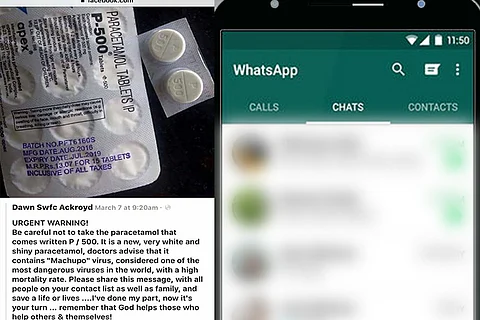

“URGENT WARNING! Be careful not to take the paracetamol that comes written P/500. It is a new, very white and shiny paracetamol, doctors advise that it contains “Machupo” virus, considered on the most dangerous viruses in the world, with a high mortality rate. Please share this message, with all people on your contact list as well as family, and save a life or lives… I’ve done my part, now it’s your turn... remember that God helps those who help others & themselves,” reads a popular WhatsApp forward.
This one claims to be warning of a new drug laced with a virus. The message which is being circulated on WhatsApp, also includes images of two people presenting with what looks like rashes on their body. It also highlights the need for stricter awareness about the harms of forwarding such false information.
The images being circulated along with the forward message
A simple Google search for the virus in this particular forward, the ‘Machupo’ virus, reveals that the message is a hoax. While there is virus called Machupo mammarenavirus which causes the ‘Bolivian hemorrhagic fever’, known cases of the same have only been reported in the South American nation of Bolivia.
Another point to note is that the drug portrayed as being ‘contaminated’ in the message is none other than a simple paracetamol. P-500 refers to nothing more than a 500 milligram dose of paracetamol, which is a standard dose given to adults. Any online search will reveal this information.
However, most people do not perform these fact checks before forwarding these messages.
“Earlier people used to spread ‘old wives tales’ which didn’t always have a factual base to them and they most certainly didn’t spread as fast. Today, with easy internet access, there is a certain loss of credibility for the information that gets circulated,” explains public health expert Dr Sylvia Karpagam. “What’s really scary is that some of these messages are extremely harmful and can end up having an extremely negative impact.”
Whether the machupo virus hoax or messages about child kidnappers on the prowl, WhatsApp forwards do have the potential to cause great harm and threat to safety. Messages such as these are dangerous when they come in the aftermath of incidents such as the one that happened last week in Hyderabad that resulted in two infants’ deaths. This happened after several babies were wrongly administered an opioid painkiller instead of paracetamol after a routine vaccination.